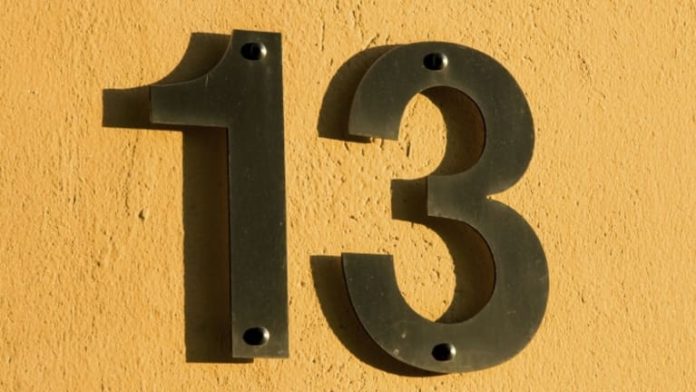For many, the number 13 is a number to be feared. We consider it to be unlucky, a number to be avoided. Others might go in the other direction, purposefully seeking out the number 13 to prove that it has no power. No matter your opinion on the number 13, here are a few interesting facts about why it has become a feared and superstitious number.
Airplanes have a 13th row, but some office buildings or hotels won’t have a room 13 or a floor 13. People who rely on luck will avoid the 13th day of the month, and some people might wait to make decisions until after this day has passed.
This fear originates in humanity’s collective past. Norse mythology tells the story of Loki, the trickster god, becoming the 13th guest at a party and killing the Norse god of light. In Roman times, witches would gather in groups of 12 people, as adding a 13th would be considered inviting in evil.
There were 13 members present at Jesus’s Last Supper, and Friday the 13th is believed by some to be the day when Jesus was crucified. Friday the 13th is also the day that King Philip IV of France decreed the arrests of the Grand Master and Knights of the Knights Templar group.
In the practice of numerology, the number 12 is seen as a full and complete number. There are 12 months in a calendar year, 12 numbers on a clock, a dozen is 12, and there are 12 signs symbolizing different aspects of the zodiac. The number coming after 12 is therefore seen as destroying this perfect number, causing uncertainty and imbalance.
However, there are aspects to the number 13 that aren’t considered unlucky. Modern pagans and Wiccans have uncovered many of the aspects of the number 13 that balance the negative sides of this number.
For those who study numerology, you will know that the composition of the number 13 are the numbers one and three. Together, these make the number four. Four is a balanced and total number, representing the four main elements and the four directions of the compass.
Conclusion
If you are nervous about the number 13, don’t be! There are reasons why this number has become unlucky over the years, and there are aspects of this number that are positive. If you’re more comfortable avoiding this number, then that’s ok but just make sure you aren’t setting up obstacles for yourself in the process.





Oh, sure, because Loki and some Roman witches clearly determine the fate of modern-day business decisions. Next you’ll tell me my Wi-Fi password affects the stock market!
For those interested in numerology, it’s worth noting that 13’s breakdown into 4 is significant. The four elements and directions offer a balanced perspective that many might overlook.
I found the numerology perspective particularly intriguing. The idea that the number four, derived from 13, represents balance is a refreshing take on what is typically considered an unlucky number.
While I normally dismiss superstitions, this article made me more aware of their origins and how they can influence behavior. It’s thought-provoking to consider both the negative and positive aspects of the number 13.
Seriously, why are we still talking about this? The number 13 is just a number. This superstitious nonsense is just holding humanity back.
The article does a commendable job of explaining why the number 13 has been viewed with suspicion throughout history. However, it could benefit from more scientific research on why people hold on to superstitions.
I agree. While the historical explanations are thorough, understanding the psychological basis for superstitions would add another layer to the discussion.
Good point. A deeper dive into the cognitive aspects of why humans are prone to superstitions would be enlightening.
I appreciate the balanced view presented in the article. It’s a good reminder that superstitions often have deep historical roots but can be reframed in a modern context.
An intriguing discussion on the number 13! It’s fascinating how cultural narratives shape our perceptions. The historical context provided here deeply enriches our understanding.
While the article attempts to balance the narrative around the number 13, it fails to account for the deep-seated emotional and psychological discomfort people associate with it. This needs more scientific scrutiny.
The historical context provided about the number 13 is fascinating. It is interesting to see how different cultures and periods have influenced our current perception of the number.
Comments are closed.